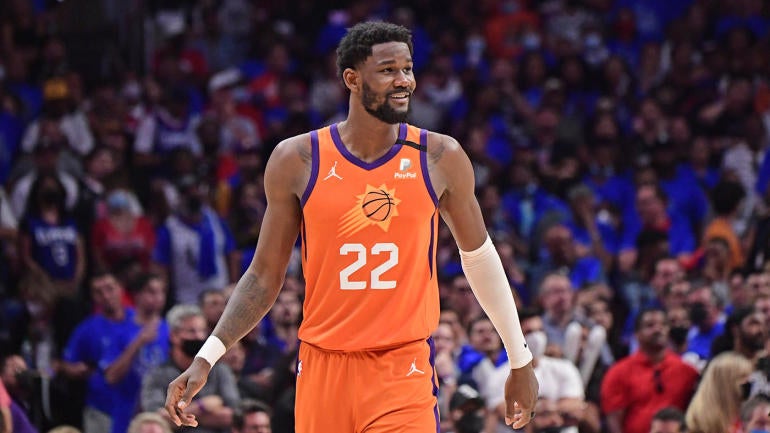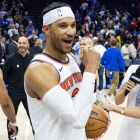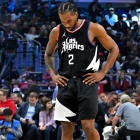
If Saturday's 19-point, 22-rebound effort in Game 4 of the Western Conference finals wasn't a coming-out party for Deandre Ayton, it's only because the party started weeks ago. Phoenix Suns coach Monty Williams said that Ayton "basically won that game for us," but four days earlier, in the afterglow of the valley-oop, Williams said Ayton had been "turning into a really dominant player on both ends of the floor" in this postseason.
Ayton, the No. 1 pick in the 2018 draft, is eligible for a contract extension this summer, and, based on his recent play, he's going to be paid like a star. Ironically, this is because he's not trying to play like one.
A breakout is typically the product of opportunity. An end-of-the bench player gets a chance to start because his team is banged-up; a lottery pick is given a chance to sink or swim with more touches, shots and playing time. Ayton's ascendance, however, is a product of moderation, of restraint, of role acceptance. Compared to the regular season, Ayton is getting fewer touches, less than half as many post touches and, on a per-minute basis, his points, assists and shot attempts are all down. His usage rate has shrunk to just 16.1 percent, and less than 10 percent of his shots have been self-created (i.e. taken after having the ball for two seconds or longer). This is particularly remarkable because almost all of these numbers were already career lows.
"He's starting to understand having a role doesn't limit you," Williams said after Game 2.
| SEASON | Frontcourt touches (per 100) | Post touches (per 100) | Usage rate | Assist rate | FGA/36 |
|---|---|---|---|---|---|
2018-19 | 47.2 | 8.9 | 21% | 9.4% | 14.3 |
2019-20 | 51.8 | 9.0 | 23.1% | 9.1% | 16.5 |
2020-21 | 42.9 | 7.6 | 17.9% | 6.6% | 11.7 |
PLAYOFFS | 35.8 | 3.7 | 16.1% | 3.8% | 10.9 |
When it comes to stats that require a player to touch the basketball, the only thing Ayton has done more frequently in the playoffs is rebound missed free throws -- he's grabbed 59.1 percent of opponents' misses at the line, up from 45.6 percent in the regular season, per Cleaning The Glass. Perhaps this is how his teammates are rewarding him for the sacrifices he has made elsewhere.
In the postseason, Ayton has taken 69 percent of his shots at the rim and made 81 percent of those shots. In the Suns' 84-80 victory over the Los Angeles Clippers on Saturday, all of his baskets that weren't assisted were either tip-ins or putbacks:
None of this is to say that he is somehow uninvolved. In Game 4 he was relentless on the glass and quick on his feet on defense, and Williams was right to call it an "unreal performance." On offense, he has replaced the face-up midrange jumpers he used to love with grunt work: Ball screens for Chris Paul, pindown screens for Devin Booker, dribble-handoffs, hard rolls to the rim. To the many analysts who doubted Ayton's ability to affect winning, it has been eye-opening.
Williams said he doesn't know when exactly the turning point was, but Ayton's "focus has gone to another level." Ayton said this is because of "the world having me as a question mark in the playoffs" and his desire to prove the world wrong. After Game 2, amped up from the adrenaline of an intense game and a last-second win, he said he'd never played so hard his life.
"He's not a liability," Phoenix forward Cameron Johnson said last week. "There's not stretches where he stops playing hard or he makes bad decisions. He's been making great decisions. His motor's been really high, and he's doing all those little things -- screening, running the court, being where he needs to be on help side, staying on the court, staying out of foul trouble. Those are huge things for us. He's a huge part of what we're doing."
Ayton takes pride in running the floor. All season, Williams has stressed that he creates open looks for his teammates by putting pressure on the rim in transition and in the halfcourt. He'll look to punish smaller defenders on the inside, but everything he's doing fits into the "point-five" philosophy that Williams and several other coaches have borrowed from the Spurs: From the moment you touch the ball, you have half a second to dribble, pass or shoot.
According to Williams, Ayton's development has accelerated thanks to lots of time watching film with assistant coach Mark Bryant and guidance from Paul and veteran forward Jae Crowder. Ayton himself said Paul has been "the best thing that happened to my career," adding that they've been discussing the minutiae of screening angles and rebound positioning since training camp.
Ayton turns 23 next month, and surely over the next few years he'll want the chance to earn a more featured role. If there is still a question mark about him, it is whether or not he'll add high-volume isolation scoring and playmaking to the skills that have turned him into such an effective complementary player. It is possible, though, for him to make All-Star teams without changing much, and it is impossible to imagine anything validating his current approach better than the Suns being a single win away from the NBA Finals.
For now at least, less is more.






















